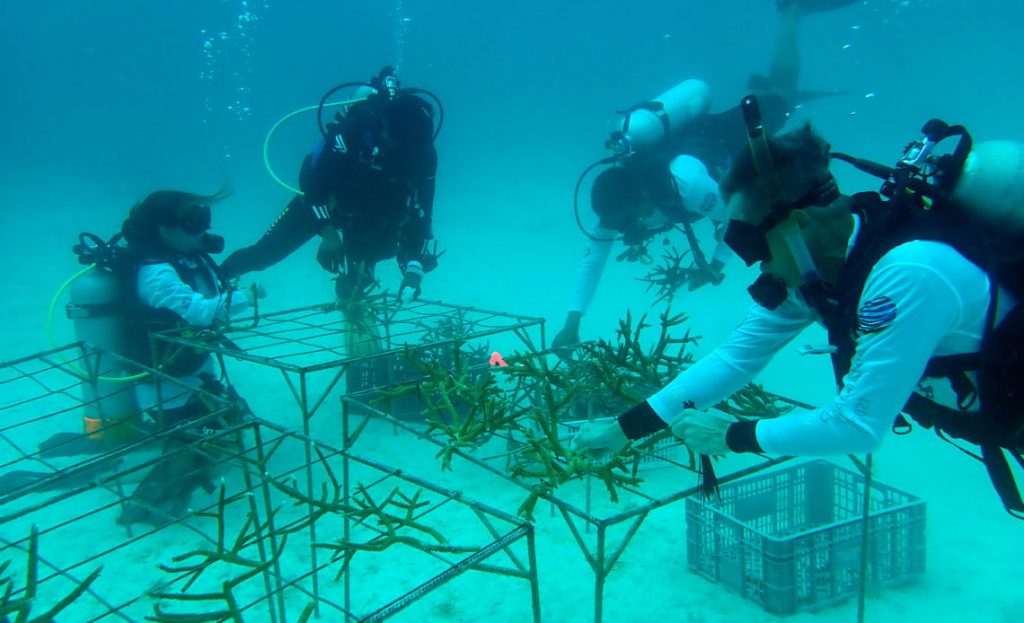
The ministries of Environment and Economy, the German Development Cooperation Agency (GIZ) and dozens of scientists, government officers, environmentalists and tourism sector representatives have joined forces for the Coralmania 2021, the largest massive coral transplant exercise in the Central American and Caribbean region. This December, three countries (Costa Rica, Honduras and the Dominican Republic) are simultaneously carrying out coral planting efforts as part of the “Transfer of Innovative Tools for the Conservation and Restoration of Coral Reefs Program.
Olaya Dotel, deputy minister for international cooperation at the Ministry of Economy, said Coralmania is a great opportunity to build an experience that can grow and become policy for the restoring of coral reefs.
German Ambassador Volker Pellet highlighted the importance of the triangular project that unites Costa Rica, Honduras and the Dominican Republic for the conservation and restoration of biodiversity and coastal protection in the region. “It is about protecting the natural beauty of the world, that you have in the Dominican Republic, Costa Rica and Honduras,” he said.
The German Development Cooperation, GIZ, and dozens of scientific, governmental, environmental and private institutions from the tourism sector have joined forces for the Coralmanía 2021, the largest massive coral transplant in the Central American and Caribbean region. The effort seeks to conserve and restore biodiversity and coastal reefs.
The regional goal is to transplant at least one square kilometer of coral reef, that is, more than 1,800 fragments are being placed in their natural environment to reintegrate with the ecosystem.
In the Dominican Republic, national expectations were exceeded when 372 fragments and 420 meters of coral were transplanted in 20 tables of one square meter, with the participation of more than 25 volunteer divers.
Deputy Minister Dotel, highlighted the importance of the multi-stakeholder alliance for coral restoration and said that having the opportunity to begin to repay the debt we have with our coral reef is fundamental, especially in small island countries like ours that are in the path of hurricanes.
The species selected for the regional transplant are Acropora cervicornis, Acropora palmata and Pocillopora spp.
The triangular cooperation initiative was approved in 2019, through the Regional Fund for Triangular Cooperation in Latin America and the Caribbean on behalf of the Ministry of Economic Cooperation and Development of the Federal Republic of Germany. It aims to promote the conservation and restoration of coral reefs in the three nations, through the transfer, exchange and consolidation of experiences and tools.
In the Dominican Republic, it has the support of the GIZ, the participation of the Vice Ministry of International Cooperation of the Ministry of Economy as the lead agency for cooperation in the country, the Ministry of Environment as counterpart entity, as well as Fundemar, with the support of the Ecosystem-based Adaptation project, financed by the Caribbean Biodiversity Fund, the Puntacana Group Foundation, the Cap Cana Foundation and The Nature Conservancy.
Rita Sellares, executive director of Fundemar explained: “The key to a successful and replicable restoration program is to adapt existing technologies and customize these to the reality of each country, the conditions of the site where it will be implemented and the technical and economic capacity of the institution. As well as the key alliances between the private sector, NGOs and government agencies, the commitment of the local community, the creation of job opportunities and training to become technicians in coral restoration creating a self-sustainable program”.
Deputy Minister Dotel thanked the government and people of Germany for this initiative and others being developed in the country. “Germany has its sights set on the environmental issue and has been accompanying us through GIZ in learning and acquiring new practices”.
Meanwhile, Yeralffi Arache Ruiz, Eastern Regional Coordinator of the Ministry of Environment, speaking on behalf of José Ramón Reyes, Vice Minister of Coastal and Marine Resources, expressed his joy for this type of collaboration in favor of these ecosystems and thanked the support received by the German government, through the GIZ, and also valued the extraordinary work being done by Fundemar, the Dominican maritime protection agency.
Read more in Spanish:
N Digital
16 December 2021

